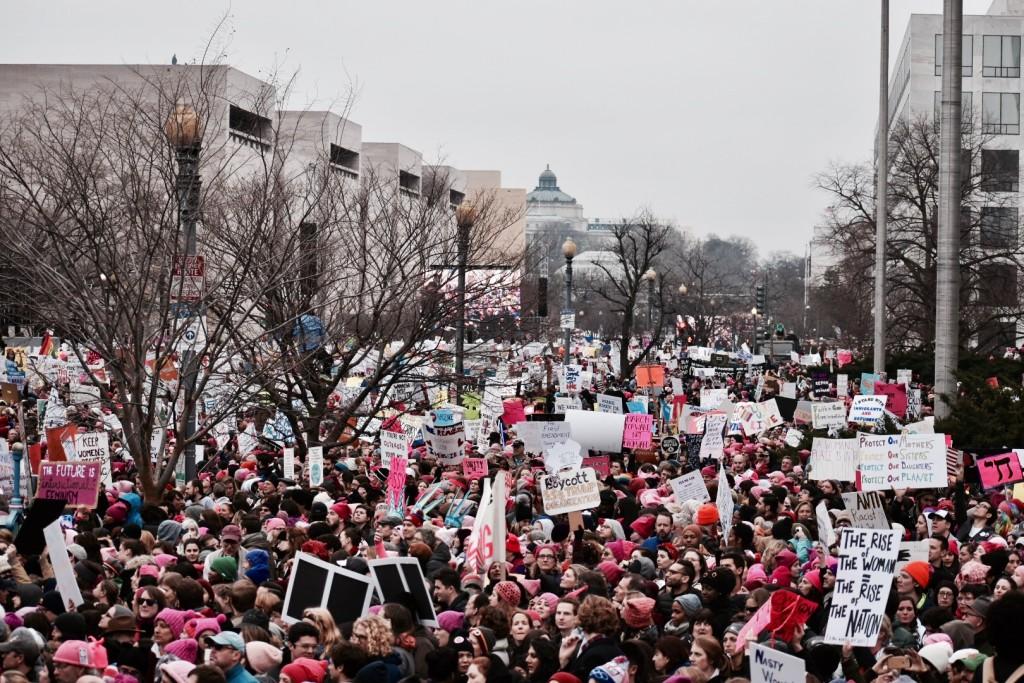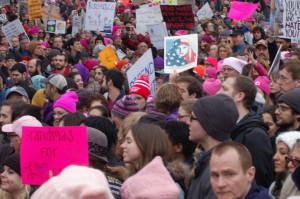
At about 2:30 p.m., Women’s March on Washington protesters filled Independence Ave. as they marched to the White House.
One day after the inauguration of President Donald Trump, more than 500,000 demonstrators marched from the Capitol to the National Mall in support of women’s rights yesterday as part of the Women’s March on Washington.
The event was one of over 600 sister marches across the United States and the world to stand in solidarity with women and their partners and children, as well as with immigrants, different religious faiths, the LGBTQ community, people of different races, people with disabilities and survivors of sexual assault.
Beginning at 11 a.m., the event featured a rally with several speakers and performers, including Angela Davis, Michael Moore, Madonna and Alicia Keys. The rally preceded the 1:15 p.m. march.
Many members of the Georgetown community also participated in the march, with Georgetown University College Democrats organizing weekend housing for college students coming in from other schools.
According to the Women’s March on Washington website, a total of 673 sister marches were held in all 50 states and on all seven continents. The march aimed to amplify women’s rights, but also served as a platform for the voices of other marginalized groups.
Trump was criticized in October for comments he made in 2005 about women, including saying he could, “grab them by the pussy.”
Trump pledged on the campaign trail to defund Planned Parenthood, which provides abortions and other healthcare services to women and men, and to appoint judges to the federal bench who would support the repeal of Roe v. Wade, a landmark 1973 decision granting a woman’s right to an abortion.
American feminist and political activist Gloria Steinem, who spoke at the rally, said women can be a powerful political force.
“We are here and around the world for a deep democracy that says we will not be quiet, we will not be controlled,” Steinem said. “We’ve elected an impossible president, we’re never going home.”
Washington, D.C. Mayor Muriel Bowser (D) said it is important for women to speak up for themselves and one another. Bowser also advocated for D.C. statehood in her speech, starting a “Leave us alone” chant with the crowd.
“I’m here to speak for all the women elected officials. We are more harshly criticized, we are more wrongly criticized at every single level, when we speak up for women,” Bowser said. “We need every man and every woman to speak up for us, too. The best thing for Congress to do is leave us alone.”

The Women’s March on Washington drew hundreds of thousands of protesters to the nation’s capital the day after President Donald Trump’s inauguration.
Actress Ashely Judd said women should be proud to be “nasty,” citing a moniker Trump gave then Democratic presidential candidate Secretary Hillary Rodham Clinton during the candidates’ Oct. 20 debate.
“I’m not as nasty as a man who looks like he bathes in Cheeto dust, whose words are a death trap to America,” Judd said. “I’m nasty like the battles my grandmothers fought to get me in that voting booth. We are here to be respected. We are here to be nasty.”
Planned Parenthood President Cecile Richards said the new administration’s anticipated plans to attack reproductive rights, including the potential overturning of Roe v. Wade by a more conservative Supreme Court, must be stopped.
“Today we are here to deliver a message. We will not take this lying down,” Richards said. “You need to call your Senator and say we cannot go back. Together we are a movement and we are unstoppable.”
Tamika Mallory, one of the march’s four national co-chairs, said women are instrumental to the political resistance movement.
“Today is an act of resistance. America cannot be great without you, me and everyone here today,” Mallory said. “We can do it if women rise up and take this nation back.”
Linda Sarsour, executive director of the advocacy group Arab American Association of New York and who was one of the march’s national co-chairs, said women, especially women of color, often lead the charge for change.
“Sisters and brothers, you are what democracy looks like. I will respect the presidency but I will not respect this president,” Sarsour said. “Want to know if you’re going the right way? Follow women of color.”
A united front is necessary to create political change, according to Carmen Perez, who also served as a national co-chair.
“We know what the problems are. To overcome this, we have to stand in solidarity,” Perez said. “We must remember that unity of action does not mean that we have to be unanimous in thought. Get involved, stay involved and keep your eyes on the prize.”
According to Senator Kamala Harris (D-Calif.), it is time for the U.S to prioritize legislation on women’s issues.
“There is nothing more powerful than a group of determined sisters, marching alongside with their partners, standing up for what we know is right,” Harris said. “We know that it is right for this nation to prioritize women’s issues.”
Harris said women’s issues extend beyond more commonly discussed topics such as abortion and childcare.
“You want to talk about women’s issues? Let’s talk about national security. Let’s talk about healthcare. Let’s talk about federal justice reform,” Harris said. “If you are a woman, period, you know that we deserve a country with equal pay and access to health care, including a safe and legal abortion protected as a fundamental and constitutional right.”
Women must hold the president accountable for his actions, according to Senator Tammy Duckworth (D-Ill.).
“We did not serve for them to roll back our rights. Go home and fight,” Duckworth said. “Women are the wall and Trump will pay.”
Political commentator Van Jones said November’s election highlighted an opportunity for both parties to better support women’s rights.
“This movement has the opportunity to stand up for the underdogs in the red and blue states,” Jones said. “I’m not going to let a bad vote let us become bad people. When it gets harder to love, let’s love harder.”
Sophie Cruz, immigrant rights activist, said people should use love to counter hate, alluding to Trump’s campaign promise to repeal the Deferred Action for Childhood Arrivals Act, which increases the number of deportation exemptions for immigrants who were brought to the country illegally before their 16th birthday.
“Let us fight with faith, love and courage so that our families will not be destroyed,” Cruz said. “Let’s fight for our rights.”
Civil rights activist Angela Davis said she is optimistic Trump’s actions will not have a significant impact on the course of history.
“History cannot be deleted like web pages,” Davis said. “Building walls will not erase history.”
Amanda Nguyen, the president and founder of national civil rights network Rise, said those attending the march were tasked with taking action to make a difference.
“In America, no one is powerless. Together with a team called Rise, we organized and did the impossible. We passed the Sexual Assault Survivors’ Bill of Rights unanimously through Congress. It represents the endless pursuit of a more perfect union,” Nguyen said. “That is what I did with my fire, what will you do with yours?”
Transgender activist Janet Mock said the values behind the march are part of a larger movement.
“By being here you are making a commitment to this work,” Mock said. “A movement is so much more than a march.”
Myrom Croel, a Trump supporter who attended the inauguration, said while he supported women’s right to protest, he believed they had equal rights to men.
“We recognize women, and if they need to be more recognized that’s fine, I don’t see where women are frowned upon, or beaten down, or anything else,” Croel said. “I think they’ve pretty well got equal rights now.”
Eric Chen (SFS ’17), who attended the march, said he hopes people maintain the fervor beyond the day.
“I wanted to be part of history. In particular, I think the Women’s March represents a wide range of issues that I care passionately about,” Chen said. “I hope it sustains a high level of youth engagement in politics.”
Hoya Staff Writer Aly Pachter contributed reporting.




















